1889-90
Further repercussions of the Scandal and finally a new post
At Fakenham Petty Sessions a case was heard in which the Rev Morris Joseph Fuller, rector of Great Ryburgh was summoned for unlawfully assaulting Gladwin Lewell Bradfield, assistant-overseer of Great Ryburgh, on December 24th. The bench considered the case was of so trivial a nature that they refused to convict, expressing the opinion that the case would never have been brought forward but for the ill-feeling existing in the parish.
Peoples Weekly Journal (D.F.T.)January 5th 1889





One is obviously asking the question as to what the Bishop of Norwich had done to solve the problem of his priest in the village. For this we must look to newspapers further afield for the answer:
Exeter and Plymouth Gazette January 28th. 1889:
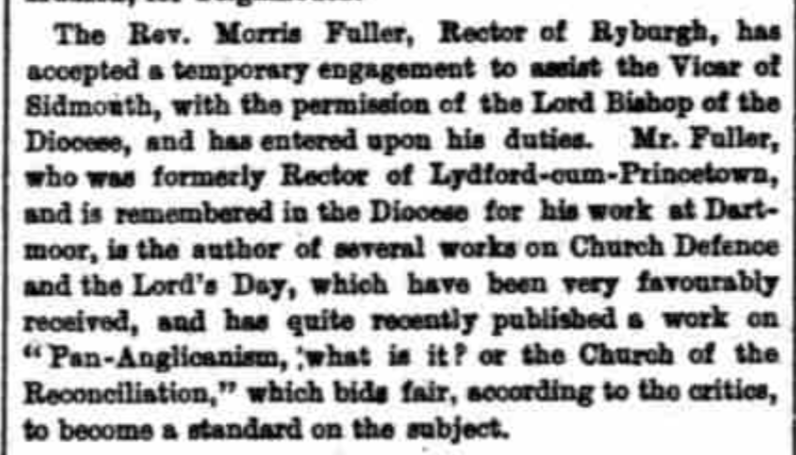
Exeter and Plymouth Gazette April 2nd. 1889:
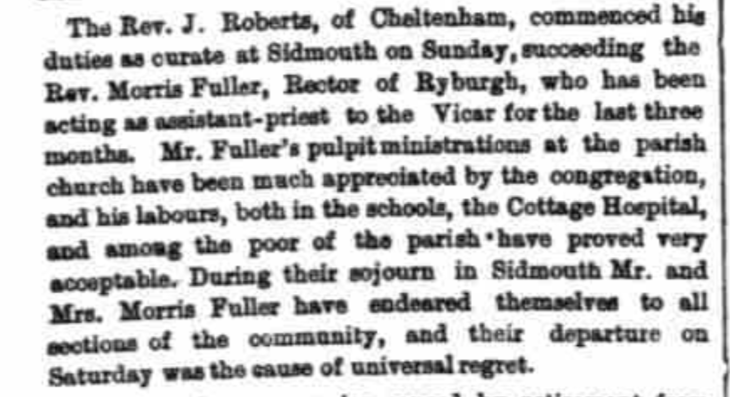
Exeter and Plymouth Gazette April 26th. 1889
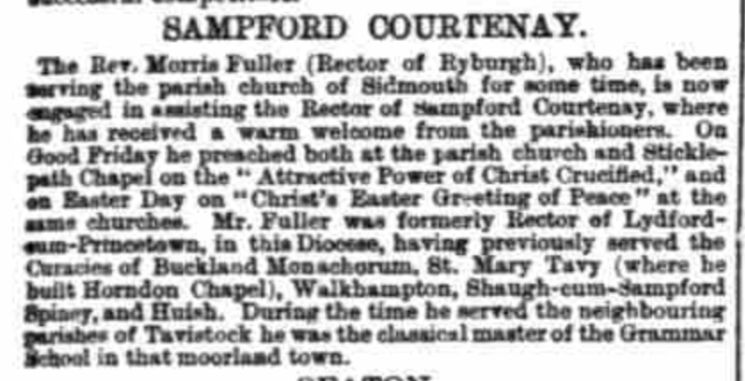
Morris can not have found it easy to be playing second fiddle to anyone and this mildly petulant rebuke to the press, on whom he relied for exposure, adds to the notion that he really couldn't help himself!
Exeter and Plymouth Gazette April 1st. 1889:
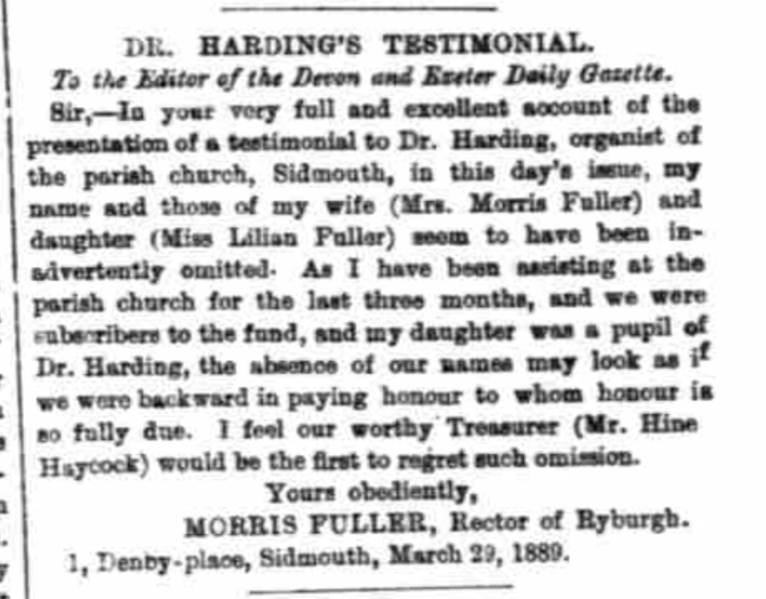
***********
Morris Fuller and the School Managers' Committee
(Taken from Managers’ Minute Book in NRO.- PD621/64)
December 18th 1889
Pursuant to a notice calling a meeting of ex-officio members, & after receiving instructions from the Lord Bishop of the Diocese to do so, to fill up vacancies on the school committee. The meeting took place at the Rectory on Wednesday Dec 18th.
There were present the Rector, Chairman, the two churchwardens, (ex officio managers) Mr Blomfield one of the Managers, and two subscribers (Messrs Cooper and Mesney)
The Chairman, in opening the proceedings explained the nature of the trust deed, and also gave a short account of the interview which he had had with the Bishop at the Palace the previous Friday – when his Lordship instructed him to convene a meeting of the ex-officio members – to fill up the vacancies on the Committee.
The Chairman said that there had been two vacancies by the deaths of the late Messrs M. Mesney and John Bell, and now there was a third by the resignation he was grieved to say, of their valued and long time friend (and who belonged to the Committee before he came to the Parish) Mr Francis from whom he had heard that very morning.
The Chairman then proceeded to read Mr Francis’ letter to the meeting, in which he regretted that owing to the spirit shown to the personalities indulged in, he could no longer remain on the Committee, therefore begged leave to retire.
That made three vacancies to be filled up. The Chairman further pointed out the stringent qualifications in the trust-deed for becoming a manager on the Committee of a National School- worked on Church of England principles
“ I ? do solemnly himself declare that I am a communicant of the Church of England” this was the present tense- not the past or future.
They would now proceed to the election. The Chairman added that the Bishop had suggested if properly qualified male persons could not be found, that ladies should serve on the Committee.
Mr Mesney was proposed by Mr Cooper (a subscriber) and seconded by Mr E Smith (ex officio member)
Mr Cooper was proposed by Mr Mesney ( a subscriber) and seconded by Mr E Smith (ex officio member)
Mrs. Fuller was proposed by the Chairman ( Rector of Parish) and seconded by Mr Blomfield ( a manager)
The Chairman was putting voting papers round the table to take the members [votes] when Mr Cooper rose and said there was no use in taking that trouble as he held 44 proxies for himself and Mr Mesney which would place them at the head. The Chairman challenged their right to become members of the Committee, as never having seen them inside the church, he didn’t understand how they could be communicants. Messrs Cooper and Mesney refused to answer questions put to them as to when and where they last communicated.
They threatened to communicate presently at Ryburgh Church and Mr Cooper reminded the Chairman of the Hoo* case. The Chairman refused to accept their declaration and said he reserved to himself the right of testing the validity of their election in the proper quarter. This led up to an unseemly wrangle and personal recriminations and the meeting ended in confusion. The Bishop’s letter was produced instructing Mr Smith to give the Chairman all the votes or counts which had come into his hand, but Mr Smith refused, saying “he didn’t care for the Bishop”
* I am very grateful for the assistance of Richard Malt and Bridget Yates at the Gressenhall Museum for identifying the reference to the Hoo Case:
Trouble began in 1888 with the Incumbent at St Werbergh, Hoo in Kent, the Revd. Percy George Benson, refusing to give Communion to the wife of the local Doctor, one Mrs. Swayne. His reason was that she had received Communion at the local Wesleyan Chapel and so branded her a schismatic. Revd. Benson was thus torn between the promotion of schism and his duty to the cure of his parish. Although in his own words he said he would abide by the instruction of the Bishop of Rochester to give the Sacrament to her, he prevaricated and it all came to a head at just the time of the Ryburgh meeting when the matter had come to the Court of Arches and the theoretical possibility of imprisonment for Benson in not carrying out the Bishop's instructions. Morris Fuller would have been very well aware of this case, Church Courts and jurisdiction being one of his hobbyhorses. Thomas Cooper must have thoroughly relished firing this particular slingshot as the meeting came to its unseemly conclusion.
************
Morris struggled on into 1890 as nominal Rector of Ryburgh conducting the marriage of Anne Smith, widow of Frederick Smith reported in the Eastern Daily Press on March 20th:
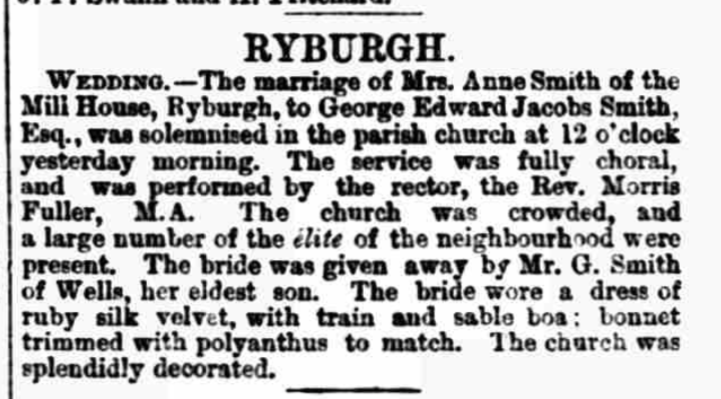
He continued with Easter Vestry Meetings, though it would appear only being present in Little Ryburgh in this report from the Thetford and Watton Times on March 29th 1890
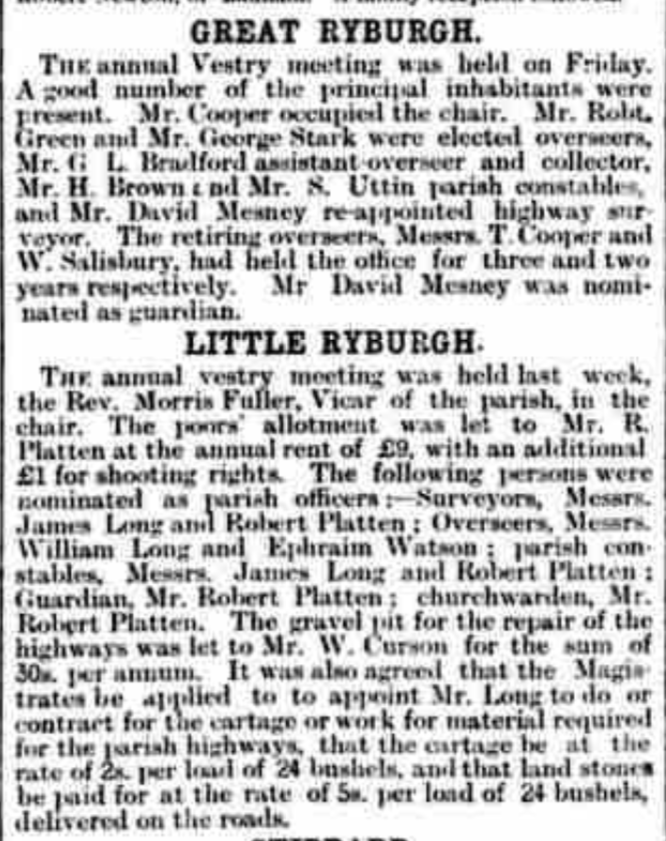
The Easter Services were reported in the Norfolk Chronicle on April 12th 1890 and it is somewhat ironic to note that one of the young ladies decorating the nave windows etc. was Louisa Holstock, one of the Shoreditch children who featured in the Scandal:
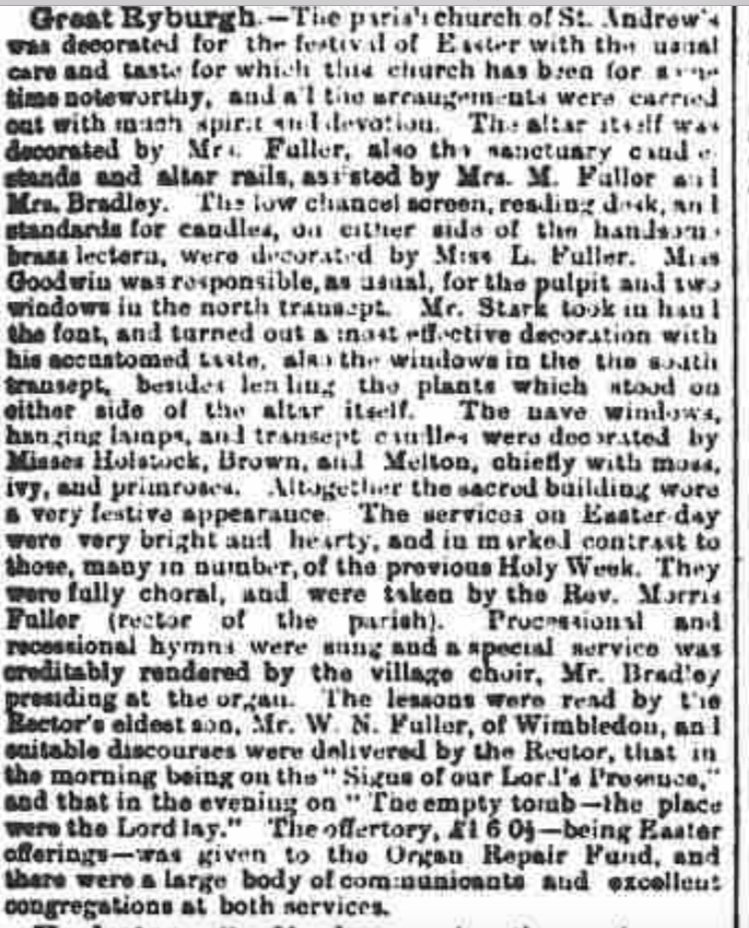
The Norfolk Chronicle April 26th. 1890 soon followed up with news of his imminent departure:
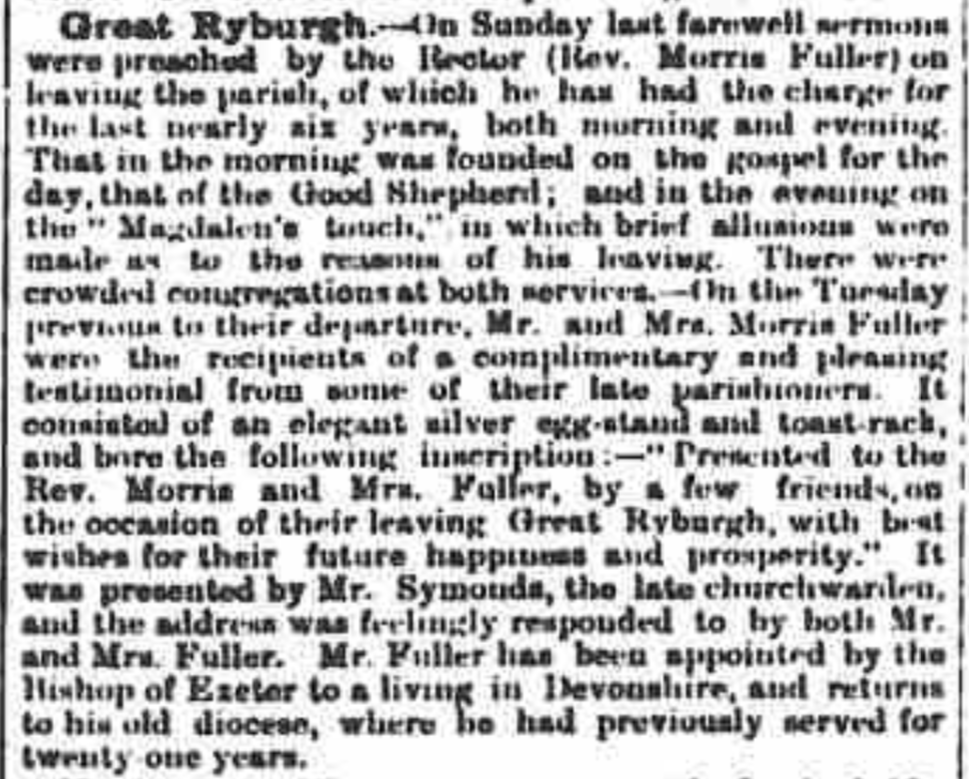
and in the Peoples Weekly Journal (D.F.T.)May 3rd. 1890
PRESENTATION TO THE RECTOR.- On Sunday the Rev. Morris Fuller preached farewell sermons at the morning and evening services. He said he was sorry he was leaving the parish; but owing to the great amount of ill-feeling existing against him, he was obliged though reluctantly, to go, and place a curate to take charge of his flock, who, he hoped would be more appreciated than he had been. On Wednesday Mr. J.P.Symonds, his late Churchwarden, waited upon the Rector and Mrs Fuller, and presented them with a beautiful silver egg stand and toast rack, subscribed for by several friends in the parish and Stibbard admirers, wishing them every happiness in their new field of labour. The kindness of Mrs. Fuller to the poor and needy will be greatly missed, as she was ever ready to help them.
As we see above, the permanent solution was another exchange of parishes, this time with Ryburgh's next Rector the Revd. Henry Fowler Baker from Bishopstawton in Devon:
Exeter Flying Post July 19th 1890
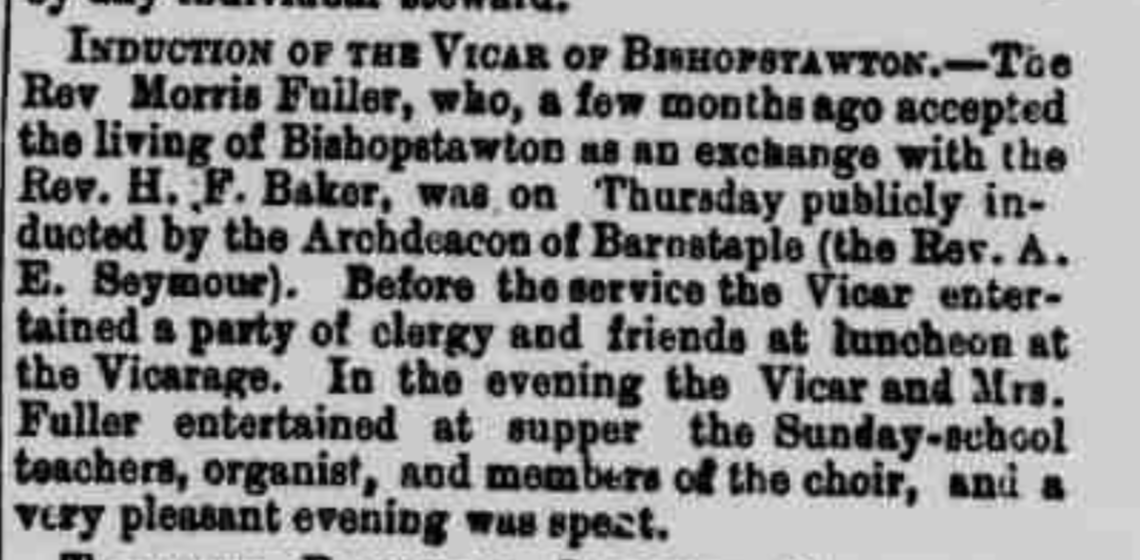
Even after he had left the Parish he still managed to get into the local papers the following year after his move to Bishopstawton. This however was the last time his name was to seriously grace the local press in Norfolk, for a few years at least:
Fakenham and Dereham Times Nov 28th. 1891.





copyright 2023